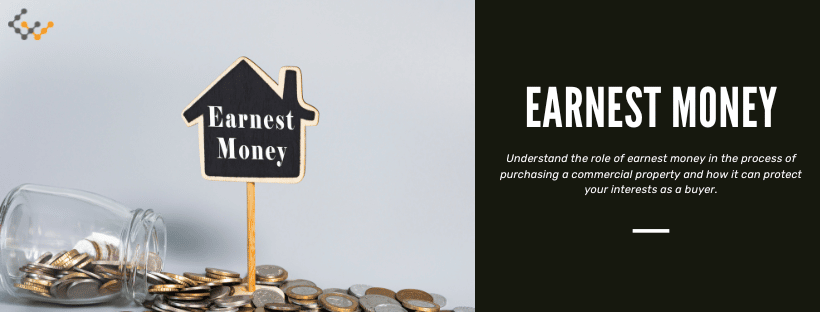Is Earnest Money Refundable in Commercial Real Estate?

Earnest money isn’t absolutely required in commercial property deals, but it’s a common feature of most agreements. Here’s a look at earnest money: what it is, how to negotiate it, and whether it’s refundable.
What is Earnest Money?
Earnest money is a deposit that the buyer of a commercial real estate property gives (indirectly) to the seller. The purpose of the deposit is to demonstrate the buyer’s intention to purchase the property — that they’re indeed a serious buyer. Without earnest money, the seller has little reassurance that the buyer won’t walk away from an agreed-upon deal.
How Does Earnest Money Work in Commercial Real Estate?
Earnest money is usually negotiated during the offer and counter-offer period of a real estate deal. The amount and specifics are settled by the time a purchase contract is signed. The buyer makes the deposit soon after a contract is signed, often on the same or next business day.
The earnest money deposit isn’t made directly to the seller. It’s instead made to an escrow account that a third party, such as a title company or bank, holds. Using an escrow account prevents dishonest sellers from taking the money and canceling the deal.
Included in the terms of a purchase agreement, the buyer will have to meet certain deadlines. The most notable one is a deadline by which financing must be obtained (or sometimes denied), but there also can be deadlines for inspections, appraisals, and other steps of the purchase process. The deadlines aren’t to rush the buyer, but to ensure that they diligently attend to their responsibilities.
The earnest money is released when the deal either closes or falls through. The third-party escrow holder will release the funds to the appropriate party, depending on the contract terms and what transpired.
How Much Earnest Money Should You Expect?
Earnest money for commercial property is most often 1% of the purchase price. This places many earnest money deposits in the $5,000 to $10,000 range, as this is 1% of $500,000 to $1 million. Total amounts can be higher or lower, though, and so too can deposits in some cases.
Highly desirable properties in hot markets can see earnest money deposits of 5% to 10%, and rarely even 15% of the purchase price. Conversely, sellers might accept sub-1% deposits if they’re having trouble unloading undesirable properties in cold markets.
Buyers and sellers should both expect the local market conditions, size and condition of a property, and overall desirability to impact how much earnest money commercial real estate properties command.
Answer a few questions and get custom mortgage quotes. We'll match you with offers from our network of 650+ lenders.
Negotiating Earnest Money: 2 Tips
Because earnest money deposits aren’t standard across all deals, this is one of many details that buyers and sellers should be prepared to negotiate. These two tips can help each party better negotiate earnest money deposits for commercial property:
General Demand: Specifically state what makes a property desirable or undesirable. Buyers may focus on a cooling or cold local market, issues with a building, maintenance that’s required, and obstacles that make a property uniquely challenging. Buyers should also note if a property has been listed for a long time, as this is a sign that there’s little demand for it.
Sellers may focus on a warming or hot local market, unique features that distinguish a property, upgrades that have been made, and well-maintained buildings. They also should note if there are multiple parties who have expressed interest and/or made offers, as this is a sign of substantial demand.
Contingencies: Contingencies can have an inverse relationship with earnest money. Giving up contingencies removes potential pitfalls that could cause a seller to forfeit earnest money, so they may be willing to accept less. Adding contingency requirements increases potential pitfalls, so sellers may want more reassurance in the form of a larger deposit.
Buyers might offer to forgo a property inspection contingency, appraisal contingency, or even financing contingency. Offering to forfeit earnest money even if financing is denied can be an especially powerful way to show serious interest and confidence. In exchange they might suggest a lower earnest amount.
Sellers might offer contingencies for a property inspection, an appraisal, financing approval, or other potential issues. In exchange, they might request more earnest money.
Is Commercial Earnest Money Refundable?
Whether the earnest money for a commercial property is refundable depends on the specifics of a purchase contract, and how the purchase process unfolds. Which party is responsible for a deal falling through is one of the biggest factors that determines whether an earnest deposit is refunded.
Who Keeps Earnest Money If a Deal Falls Through?
Earnest money usually isn’t refundable when the buyer is responsible for a purchase falling apart. Most notably, buyers generally shouldn’t expect their deposit returned if the deal falls apart because they fail to secure financing in time.
Earnest money is more likely to be refundable when the seller causes a purchase to fall through. Should a seller specifically pull away for any reason after a purchase contract is signed, they should be prepared for the deposit to be refunded to the buyer.
In some cases, purchase contracts have a financing contingency that refunds the earnest money even if a buyer can’t secure financing in time. This is less common, but could be included in slower markets or other situations where there’s little demand for a particular property.
Should an issue with an inspection or appraisal arise, such issues are usually negotiated in a manner that allows the purchase process to continue. If a buyer and seller can’t agree on a solution to a major problem, however, whether the earnest deposit is refunded depends on the specific problem and what contingencies have been included.
Wrapping Things Up
Be prepared to negotiate earnest money anytime you enter into a purchase for commercial real estate property. So long as you understand what the deposit is and its purchase, you should be prepared to negotiate the best possible agreement terms — including whether you want the deposit to be refundable.

